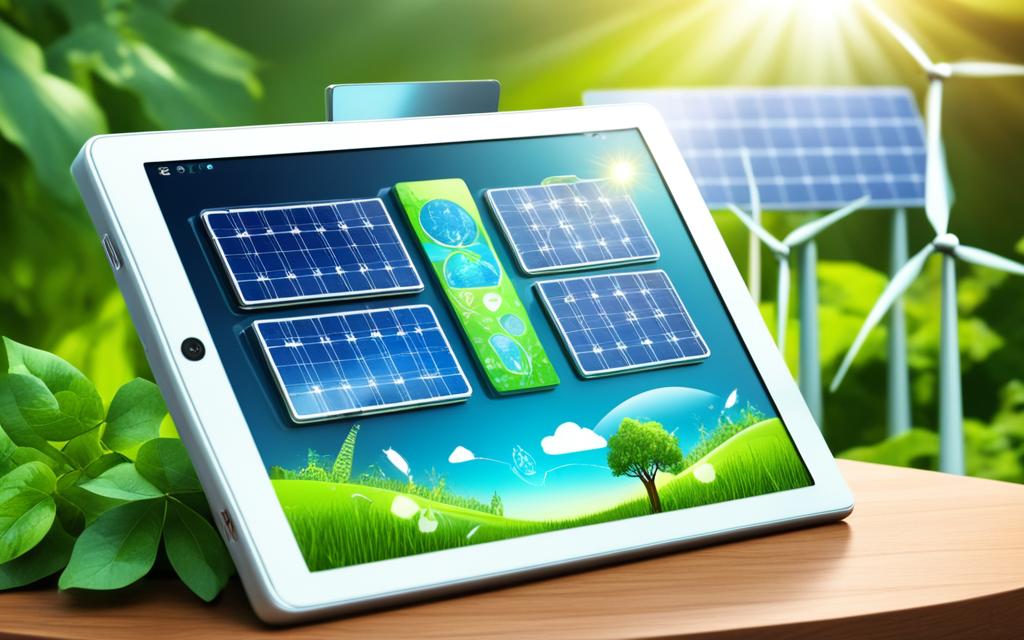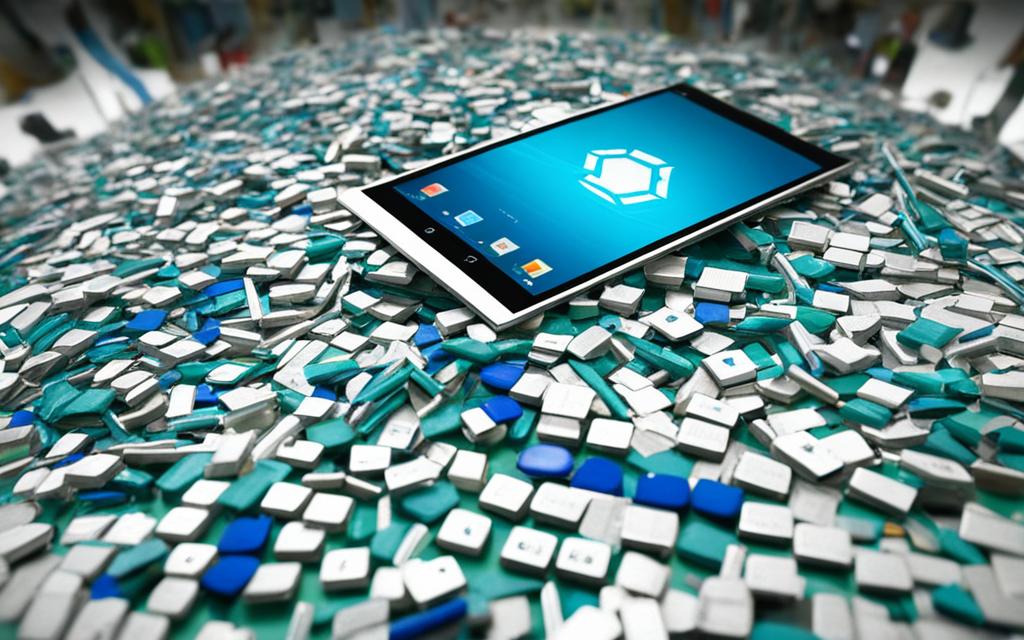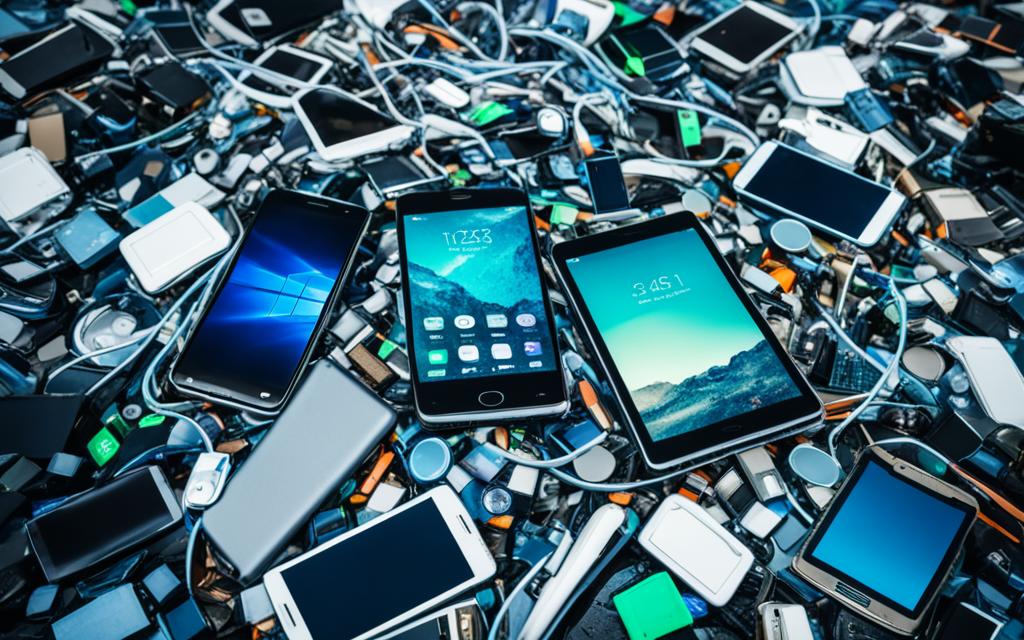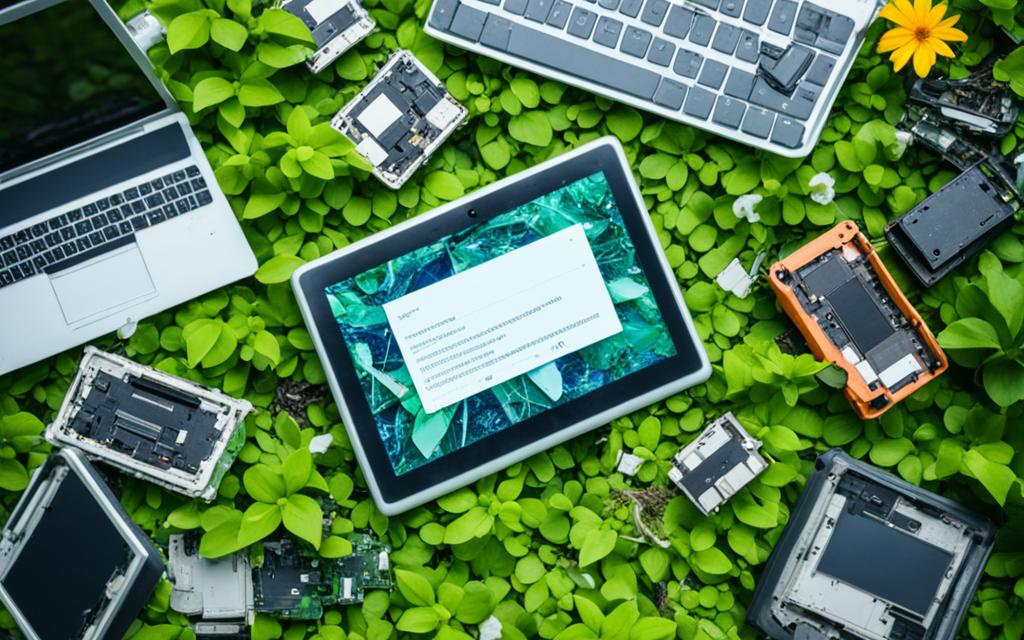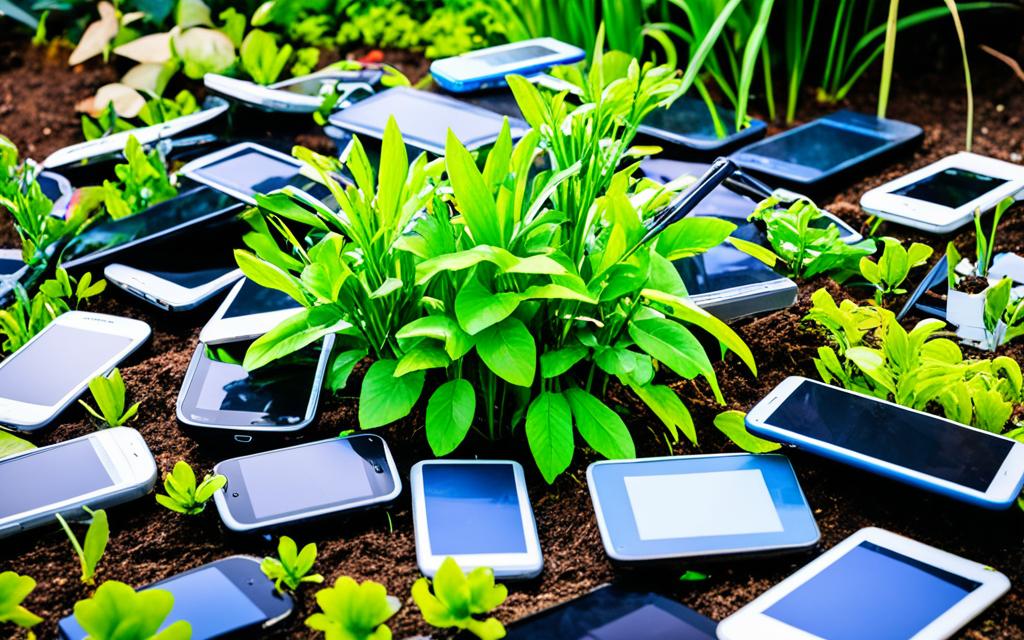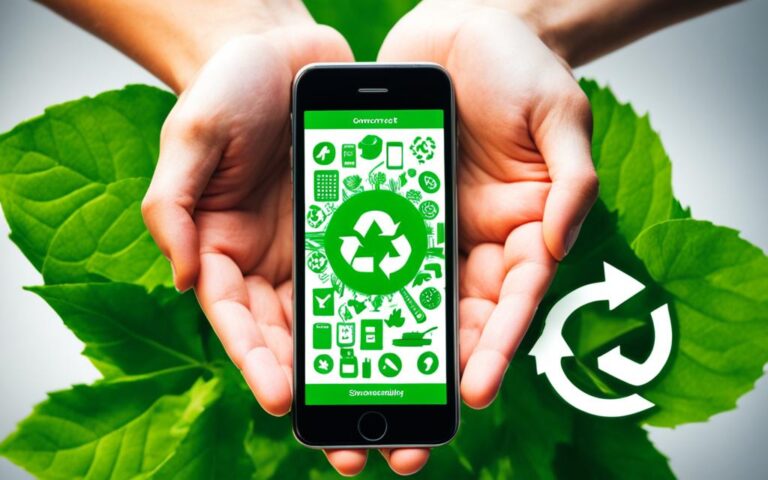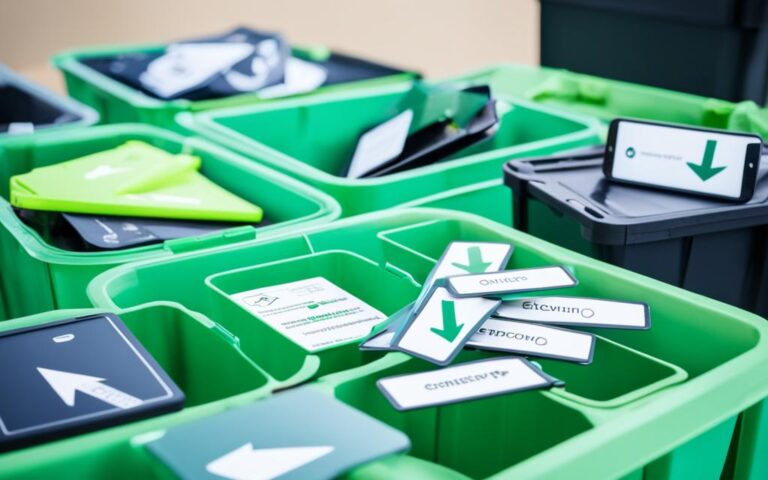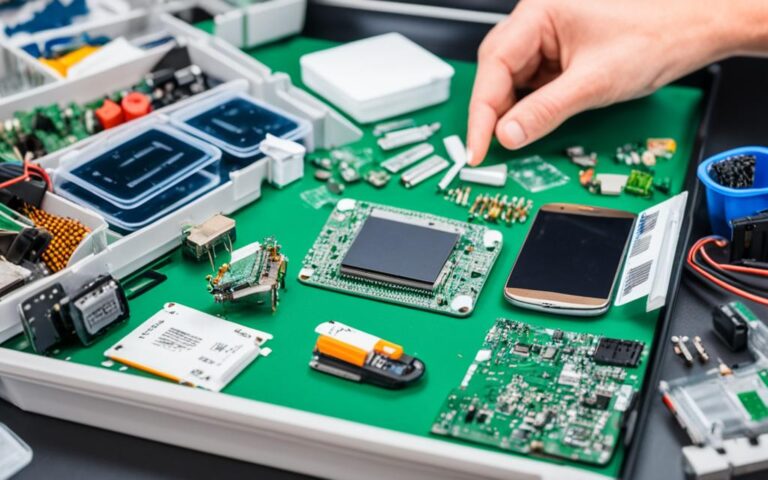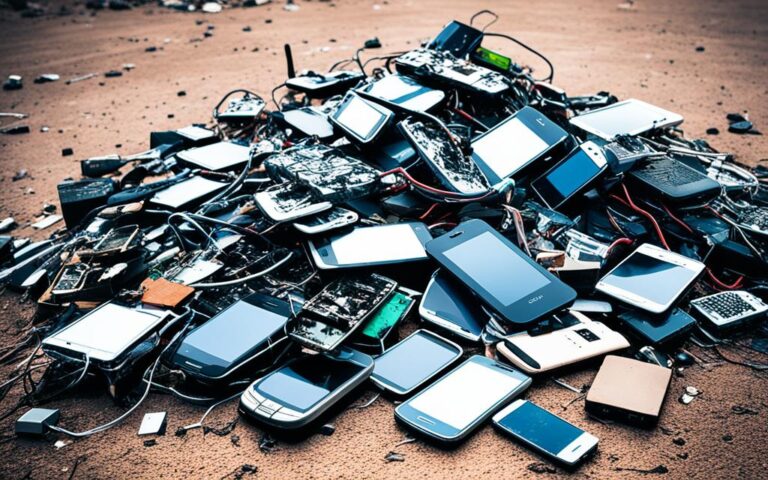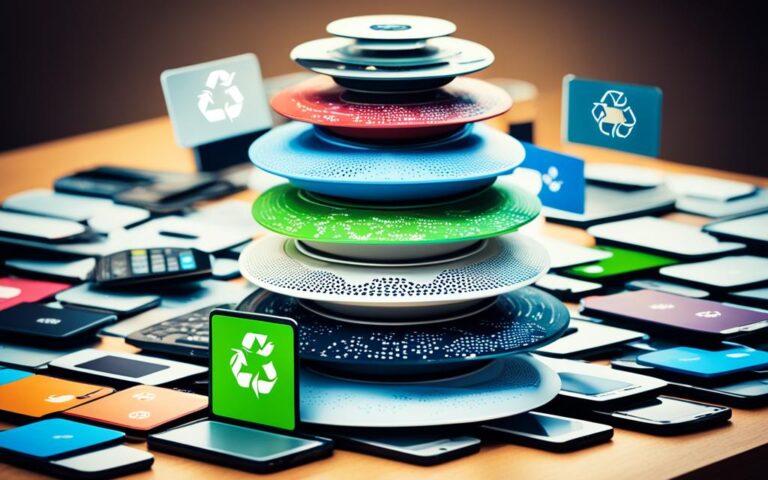Why Recycling Tablets Is Crucial for Sustainable Technology
Welcome to our article on the importance of recycling tablets for sustainable tablet technology and a greener future. In today’s digital age, where tablets have become an integral part of our lives, it is crucial to understand the environmental impact of electronic waste and the benefits of responsible recycling. By recycling tablets, we can contribute to a more sustainable and eco-conscious future, ensuring that valuable materials are reclaimed, reducing the demand for new resources, and minimizing the adverse effects of improper e-waste disposal.
The Environmental Impact of E-Waste
Electronic waste, or e-waste, poses significant environmental challenges that need to be addressed urgently. This rapidly growing waste stream consists of outdated and discarded electronic devices such as cell phones, computers, televisions, and household appliances. Improper disposal of e-waste can release toxic substances and heavy metals, including chromium, cadmium, mercury, and lead, into the environment, endangering the soil, air, and waterways. The EPA estimates that globally, there are approximately 60 million tons of e-waste generated each year.
Recycling electronic devices not only helps save landfill space but also allows for the recovery of valuable materials like precious metals (gold, silver, platinum), copper, aluminum, plastic, and glass. These materials can be reclaimed and reused, reducing the demand for new raw materials and conserving important natural resources. Furthermore, the production of new electronic devices contributes to greenhouse gas emissions, while using recycled materials helps lower the demand for virgin materials, thus reducing the environmental impact.
To illustrate the magnitude of the environmental impact of e-waste and the benefits of recycling, consider the following table:
| E-Waste Impact and Recycling Benefits | |
|---|---|
| Impact/Recycling Benefit | Description |
| Toxic Substances and Heavy Metals | E-waste contains hazardous substances like chromium, cadmium, mercury, and lead, which can pose serious health and environmental risks when improperly disposed. |
| Landfill Space Saving | Recycling electronic devices helps reduce the amount of e-waste going to landfills, conserving valuable disposal space. |
| Valuable Materials Reclamation | Recycling electronic devices allows for the recovery of precious metals, copper, aluminum, plastic, and glass, conserving natural resources and reducing the need for virgin materials. |
| Reduction of Greenhouse Gas Emissions | Using recycled materials in the production of electronic devices helps lower the demand for virgin materials and decreases the associated greenhouse gas emissions. |
It is clear that the environmental impact of e-waste is extensive, but by recycling electronic devices, we can mitigate these effects and contribute to a greener, more sustainable future.
The Benefits of Recycling Tablets
Recycling tablets offers numerous benefits for both the environment and society. Firstly, tablets contain valuable materials such as precious metals (gold, silver, platinum), copper, aluminum, plastic, and glass, which can be reclaimed through the recycling process. This helps conserve natural resources by decreasing the demand for new raw materials.
Additionally, recycling tablets contributes to the reduction of e-waste, diverting these devices from landfills and preventing the release of toxic chemicals and heavy metals into the environment. Energy savings are another significant advantage, as the production of new electronic devices consumes substantial amounts of energy. By recycling tablets and reusing their components, energy consumption and greenhouse gas emissions can be reduced.
Recycling electronic devices also creates job opportunities in areas such as collection, transportation, refurbishment, recycling, and sales. Furthermore, responsible e-recyclers ensure that sensitive data stored on old devices is properly destroyed or securely erased, protecting individuals and businesses from data breaches.
Finally, by recycling tablets, we contribute to environmental protection by mitigating the risks of improper e-waste disposal and promoting responsible electronic waste management.
| Benefits of Recycling Tablets | Keywords |
|---|---|
| Conserves natural resources | resource conservation |
| Reduces e-waste | reduction of e-waste |
| Saves energy | energy savings |
| Creates job opportunities | job creation |
| Ensures data security | data security |
| Protects the environment | environmental protection |
Best Practices for Tablet Recycling
To effectively recycle tablets, there are several best practices that can be implemented. By following these practices, individuals and institutions can contribute to a more sustainable future and ensure the responsible disposal of electronic waste.
Device Refresh Cycle
One effective practice is to establish a device refresh cycle. This involves regularly retiring outdated tablets and reallocating others within the organization. By doing so, devices are continuously recycled and replaced, reducing the accumulation of electronic waste. Implementing a device refresh cycle ensures that tablets are kept up to date and efficiently managed.
Pickup Programs
Another practice that can simplify the recycling process is the implementation of pickup programs. These programs allow individuals, such as students, faculty, and staff, to safely and securely recycle their personal and school-owned electronics, including tablets. Pickup programs often accept a wide range of devices, making it convenient for individuals to participate in recycling initiatives.
Recycling Events
Schoolwide electronics recycling events can be an effective approach to encourage the entire community to participate in recycling initiatives. By hosting such events, institutions can promote awareness and education about the importance of recycling tablets and other electronic devices. These events provide opportunities for individuals to bring their old tablets and contribute to the sustainable management of electronic waste.
Compliance with Local Municipality Regulations
It is essential for institutions to comply with their local municipality’s regulations regarding the disposal of e-waste. These regulations may dictate specific guidelines for the handling and recycling of tablets. By adhering to these regulations, institutions can ensure that tablets are disposed of responsibly and in accordance with local environmental guidelines.
Manufacturer Recycling Programs
Checking with tablet manufacturers for recycling programs is another recommended practice. Many manufacturers offer recycling options for their products, allowing individuals and institutions to easily recycle their outdated tablets. These programs often provide detailed instructions for the proper disposal of tablets, ensuring that they are recycled in an environmentally friendly manner.
Partnering with Reputable Recycling or Device Management Companies
Alternatively, institutions can partner with reputable recycling or device management companies to streamline the entire tablet recycling process. These companies have expertise in handling electronic waste and can ensure compliance with regulations and proper disposal methods. Partnering with such companies can provide peace of mind and confidence that tablets are being recycled responsibly.
By implementing these best practices, institutions and individuals can contribute to a more sustainable future by effectively recycling tablets and responsibly managing electronic waste.
The Role of Universities in Electronic Waste Management
As sustainability becomes a priority for higher education institutions, electronic waste management should be given significant attention. With the increasing use of electronic devices on campuses, universities often face challenges in properly managing e-waste. Mishandling e-waste can have severe environmental and health consequences, as e-waste is the fastest-growing solid waste stream globally. Universities are in a unique position to make a difference by implementing device recycling programs as part of their sustainability initiatives. These programs can involve establishing device refresh cycles, pickup programs for safe and secure recycling, and hosting electronics recycling events. By recycling devices, universities contribute to resource conservation, reduction of e-waste, energy savings, job creation, and the protection of the environment. Universities can also collaborate with local municipalities, device manufacturers, and device management partners to ensure compliance with regulations, access recycling programs, and streamline the entire e-waste management process. Through their commitment to electronic waste management, higher education institutions can play a vital role in promoting sustainability and a greener future.
| Benefits of University E-Waste Recycling Programs | Actions Taken |
|---|---|
| Resource Conservation | Establishing device refresh cycles |
| Reduction of E-waste | Implementing pickup programs |
| Energy Savings | Hosting electronics recycling events |
| Job Creation | Collaborating with local municipalities |
| Environmental Protection | Partnering with device manufacturers |
| Collaborating with device management partners |
Conclusion
In conclusion, recycling tablets is crucial for achieving sustainable tablet technology and a greener future. By responsibly recycling tablets, we can effectively manage e-waste and reduce its harmful impact on the environment. Through the recycling process, valuable materials such as precious metals, copper, aluminum, plastic, and glass can be reclaimed, contributing to resource conservation and reducing the need for new raw materials.
Furthermore, recycling tablets not only saves energy but also creates job opportunities in various sectors of e-waste management, from collection and transportation to refurbishment and recycling. By promoting data security and protecting sensitive information stored on old devices, we ensure the safety of individuals and businesses.
Higher education institutions play a vital role in electronic waste management by implementing device recycling programs, adhering to regulations, and collaborating with stakeholders. Together, we can make a difference in building a more sustainable and eco-conscious future. Let us embrace our environmental responsibility and contribute to the preservation of our planet through responsible tablet recycling.
FAQ
Why is recycling tablets crucial for sustainable tablet technology?
Recycling tablets is crucial for sustainable tablet technology because it helps conserve natural resources, reduce electronic waste, save energy, create job opportunities, ensure data security, and protect the environment from the harmful effects of improper e-waste disposal.
What is e-waste and what are the environmental impacts of electronic waste?
E-waste refers to outdated and discarded electronic devices, including tablets, that can release toxic substances and heavy metals into the environment if not properly disposed. This poses significant environmental challenges, such as soil and water contamination. Recycling electronic devices helps save landfill space and allows for the recovery of valuable materials, reducing the demand for new raw materials and greenhouse gas emissions.
What are the benefits of recycling tablets?
Recycling tablets offers several benefits, including the reclamation of valuable materials, resource conservation, reduction of e-waste, energy savings, job creation, data security, and environmental protection.
What are some best practices for tablet recycling?
Best practices for tablet recycling include establishing a device refresh cycle, implementing pickup programs, hosting recycling events, complying with local municipality regulations, checking with device manufacturers for recycling programs, and partnering with reputable recycling or device management companies.
What role do universities play in electronic waste management?
Universities can make a significant impact on electronic waste management by implementing device recycling programs as part of their sustainability initiatives. They can collaborate with local municipalities, device manufacturers, and device management partners to ensure compliance with regulations, access recycling programs, and streamline the e-waste management process.
Why is recycling tablets important for sustainable technology?
Recycling tablets is important for sustainable technology because it contributes to resource conservation, reduction of e-waste, energy savings, job creation, data security, and the protection of the environment from the harmful effects of improper e-waste disposal.

